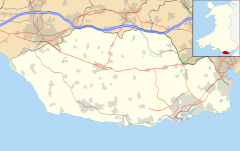Cowbridge
Cowbridge
|
|
|---|---|
 Cowbridge High Street |
|
| Cowbridge shown within the Vale of Glamorgan | |
| Population | 4,063 (community 2011) |
| OS grid reference | SS995745 |
| Community | |
| Principal area | |
| Ceremonial county | |
| Country | Wales |
| Sovereign state | United Kingdom |
| Post town | COWBRIDGE |
| Postcode district | CF71 |
| Dialling code | 01446 |
| Police | South Wales |
| Fire | South Wales |
| Ambulance | Welsh |
| EU Parliament | Wales |
| UK Parliament | |
| Welsh Assembly | |
Cowbridge (Welsh: Y Bont-faen) is a market town in the Vale of Glamorgan in Wales, approximately 7 miles (11 km) west of Cardiff (12 miles west of Cardiff Bridge). Cowbridge is twinned with Clisson in the Loire-Atlantique department in northwestern France. Cowbridge is part of the Cowbridge with Llanblethian community (civil parish) which elects a Town Council.
The town lies on the site of a Roman settlement identified by some scholars as the fort of Bovium (cow-place). Recent excavations have revealed extensive Roman settlement; the town lies alongside a Roman road. There are 17th century references to a 'cow-bridge' over a tributary of the river Thaw (which flows through the town) but Cowbridge's Welsh name, Y Bont-faen, means literally 'the stone bridge'.
The town centre is still arranged on its medieval plan, with one long street divided into "burgage plots". It is one of very few medieval walled towns in Wales, and substantial portions of the walls, together with the south gate, are still standing. On 13 March 1254, Cowbridge received its first borough charter from Richard de Clare, the Lord of Glamorgan. Richard de Clare was one of the most powerful Barons of the day, having huge estates stretching across much of South Wales and also lands in southern and eastern England. The town walls were built following this, sometime in the latter half of the 13th century. From 1243 de Clare was actively extending his authority in Glamorgan; in 1245 he seized the manors of Llanblethian, Ruthin and Talyfan from Richard Siward, and the lordships of Miskin and Glynrhondda from Hywel ap Maredudd. In Llanblethian he founded the town of Cowbridge and in Miskin he founded the castle and town of Llantrisant. The largely medieval church of the Holy Cross was initially a chapel of ease to the parish church at Llanblethian. In 1307 Earl Gilbert de Clare, grandson of Richard de Clare, began work on the stone fortifications of St Quintins Castle in Llanblethian.
...
Wikipedia

